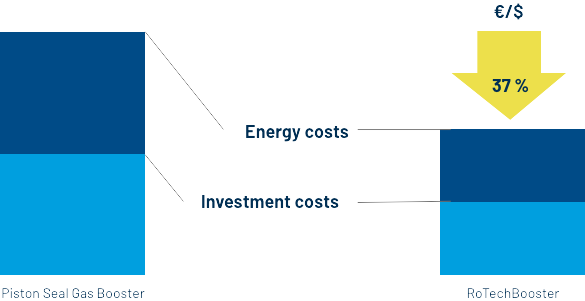The best means to understand the electrically driven RoTechBooster advantages over an air-driven piston booster is to calculate their cost in a real-world scenario. The comparison beneath shows the investment for each alternative in a pipeline application example.
| 1. Required Size of Utilities [kW] | Piston Seal Gas Booster | RoTech Booster | RoTech Booster Savings |
|---|---|---|---|
| Air compression | 37.5 | 15 | |
| Dryer | 6 | 1.75 | |
| TOTAL Utility Size [kW] | 43.5 | 16.75 | -61,5 % |
The devil is in the details and with this, the advantages of the RoTechBooster become obvious.
The calculation below only accounts for initial investment cost and power consumption. Total cost of ownership will deliver even higher savings, due to the RoTechBooster’s higher reliability and lower maintenance expenses.

| 2. Initial Costs [Normalized] | Piston Seal Gas Booster | RoTech Booster | RoTech Booster Savings |
|---|---|---|---|
| Auxiliary Equipment (Air compression & dryer) | 1 | 0.48 | |
| Seal Gas Booster | 0.06 | 0.23 | |
| TOTAL Initial Costs | 1.06 | 0,71 | -33 % |
| 3. Power Demand [kW] | Piston Seal Gas Booster | RoTech Booster | RoTech Booster Savings |
|---|---|---|---|
| Booster Load | 18.3 | 3.75 | |
| Station Air Load | 16.75 | 16.75 | |
| TOTAL Power Demand [kW] | 35.05 | 20.5 | -41 % |
| Example savings for 1,000 operating hours per year | -14,550 kW | ||
| Example savings for 2,000 operating hours per year | -29,100 kW | ||
| Example savings for 4,000 operating hours per year | -58,200 kW | ||
Based on your data a personal budget calculation can be provided. Contact us and an EagleBurgmann expert in your region can assist you.